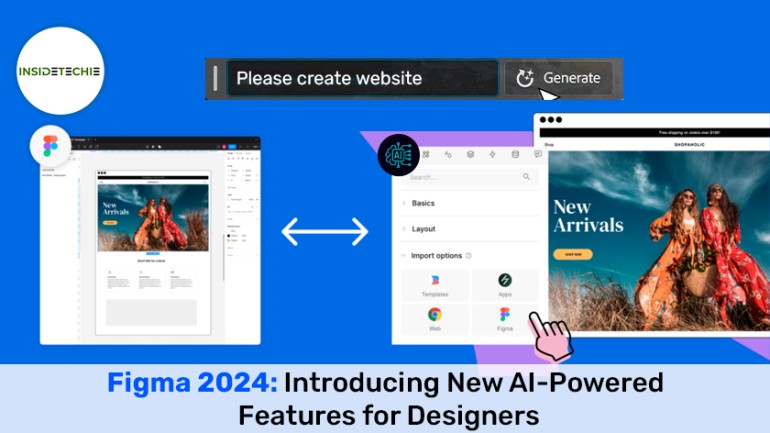The year is 2024, and the design landscape is shifting. Figma, the design platform beloved by millions, has unleashed a wave of innovation with its integration of Artificial Intelligence (AI). Designers constantly seek tools and technologies that not only enhance their creativity but also streamline their workflows. Figma, a leading collaborative design tool, has been at the forefront of innovation, consistently introducing new features to meet the evolving needs of designers worldwide. As we enter 2024, Figma unveils its latest offering: a suite of AI-powered features designed to revolutionize the design process.
This isn’t just a minor update; it’s a revolution waiting to happen, poised to transform the way designers work and unleash their creative potential.
The Role of AI in Design:
Artificial intelligence (AI) has permeated nearly every industry, and design is no exception. With its ability to analyze data, recognize patterns, and make predictions, AI holds tremendous potential for transforming the way designers work. Figma recognizes this potential and has integrated AI into its platform to empower designers with new capabilities and insights.
Smart Layouts: Enhancing Design Efficiency:
One of the standout features of Figma 2024 is its smart layout functionality. Powered by AI algorithms, Figma now offers intelligent layout suggestions that help designers optimize their designs. Whether arranging elements on a canvas or refining the composition of a design, Figma’s AI analyzes the user’s actions and provides recommendations that improve efficiency and aesthetics.
For example, when designing a website or mobile app layout, Figma’s AI can suggest optimal spacing, alignment, and grid configurations based on design best practices. This not only saves time for designers but also ensures consistency and coherence across the design.
Adaptive Prototyping: Designing for All Devices:
In today’s multi-device world, responsive design is essential. Figma 2024 introduces adaptive prototyping, a feature that leverages AI to automatically adjust prototypes to fit various screen sizes and resolutions. Designers can now create prototypes that seamlessly adapt to desktops, tablets, and mobile devices, eliminating the need for manual adjustments and iterations.
With adaptive prototyping, designers can focus on crafting engaging user experiences without worrying about compatibility issues or device-specific constraints. This not only speeds up the design process but also ensures a consistent and polished user experience across different devices.
Contextual Design Insights: Informed Decision-Making:
Understanding user behavior and preferences is critical for creating successful designs. Figma’s new AI-powered insights feature provides designers with valuable data and analytics directly within the design environment. From user engagement metrics to demographic trends, designers gain insights that inform their design decisions and drive user-centric design processes.
For example, Figma can analyze user interactions with a prototype and provide feedback on which elements are most engaging or where users are encountering friction. Armed with this information, designers can iterate on their designs to better meet the needs and expectations of their target audience.
Collaborative AI-Assisted Design: Enhancing Teamwork:
Collaboration is key to successful design projects, and Figma has always prioritized collaboration with its cloud-based platform. Figma 2024 fosters seamless collaboration and clear communication With the latest updates, Figma takes collaboration to the next level with AI assistance. Design teams can now leverage AI-powered collaboration tools that facilitate real-time feedback, version control, and conflict resolution.
For instance, Figma’s AI can analyze design feedback from team members and suggest solutions to common issues or conflicts. This streamlines the feedback process and helps teams resolve issues more efficiently, ultimately leading to faster project completion and higher-quality designs.
Looking Ahead: The Future of Design with Figma:
As we embrace the dawn of Figma 2024, it’s clear that AI integration marks a significant milestone in the evolution of design tools. With its innovative approach to AI-powered features, Figma empowers designers to push boundaries, explore new possibilities, and create experiences that resonate with users on a deeper level.
In conclusion, Figma 2024 heralds a new era of design innovation, where AI becomes an indispensable ally for designers worldwide. As we embark on this journey together, let’s embrace the transformative power of AI and unlock new frontiers in design excellence.
 :
https://www.xceltec.com/services/ui-ux-design/
:
https://www.xceltec.com/services/ui-ux-design/












